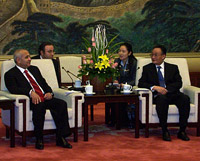The Armenian government, which has been resisting the world crisis with silence, is now concerned of the possible impact of the crisis on the Armenian economy.
Recently Hovik Abrahamyan, speaker of the National Assembly, paid an official visit to China. One of the main issues discussed during this visit was the possibility of taking 1 billion USD borrowing from China.
Hovik Abrahamyan’s delegation was met by the president of the Committee of the All-China Assembly U. Bango in Beijing. Hovik Abrahamyan says that during the meeting with Mr. Bango they discussed issues concerning parliamentary cooperation in the sphere of finances and economy. Abrahamyan also met with the vice president of the Committee of All-China Assembly Mr. LI Chunsheng. “I asked the deputy prime minister to provide a borrowing of 1 billion USD to our government.
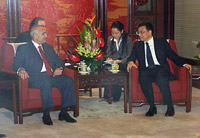 Before meeting with the PM I asked the speaker of the parliament to discuss that issue with the government before our meeting. I asked him to take into consideration the international crisis and to talk to the government for us. The deputy prime minister said that the speaker and he had talked to the president of China. He suggested our government to send an official letter from our government and he will instruct the corresponding departments in charge of that issue to discuss that issue. I believe that if we work well, I mean the Embassy and government officials, we will succeed. I think that it is very important and one billion may help us to weaken the impact of the crisis expected during this year,” said Hovik Abrahamyan to journalists. In answer to a question that according to their preliminary arrangements whether such borrowing will be given for long or short-term basis or with high or low interest rates he said, “We reached a political agreement, and you know that the most important thing is the political agreement. As for the mechanisms, interest rates and terms, they said that the officials of our corresponding department should visit China to discuss that issue. I think that we are not the ones to discuss such mechanisms.”
Before meeting with the PM I asked the speaker of the parliament to discuss that issue with the government before our meeting. I asked him to take into consideration the international crisis and to talk to the government for us. The deputy prime minister said that the speaker and he had talked to the president of China. He suggested our government to send an official letter from our government and he will instruct the corresponding departments in charge of that issue to discuss that issue. I believe that if we work well, I mean the Embassy and government officials, we will succeed. I think that it is very important and one billion may help us to weaken the impact of the crisis expected during this year,” said Hovik Abrahamyan to journalists. In answer to a question that according to their preliminary arrangements whether such borrowing will be given for long or short-term basis or with high or low interest rates he said, “We reached a political agreement, and you know that the most important thing is the political agreement. As for the mechanisms, interest rates and terms, they said that the officials of our corresponding department should visit China to discuss that issue. I think that we are not the ones to discuss such mechanisms.”
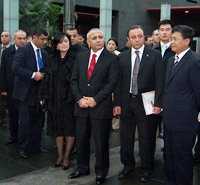 It is interesting whether the Armenian government can resist and overcome the expected income of the crisis on the economy with the borrowing provided by the Chinese government. “We are expecting to get borrowing from Russia too and this process has started. I think that no one can clearly understand what the result of the international financial crisis will be. We will have a clear picture of that next September.” The speaker also does not inform any details concerning the specific fields the potential borrowing may be given to and says that it is subject to further discussion by the government. However, Hovik Abrahamyan believes that first of all the government should support banks to enable them provide mortgage credits to citizens. “I think that it may help to re-activate the process of providing mortgage credits and enable people buy apartments and cars. We should also support small and medium businesses and agriculture. We should support and provide financial support to the companies that have temporary problems in order not to let them fire people. Our country is small and I think that if we have such financial resources, we will be able to reduce the level of impact of the economic and financial crisis,” said Hovik Abrahamyan. It is worth mentioning that during this visit Hovik Abrahamyan and U. Bango signed a memorandum of understanding on change of experience and cooperation, which also focuses on developing relations between the parliaments of the two countries and change of experience in different fields. “I attach importance to the memorandum between the two parliaments, which is the first one. It includes different important provisions.
It is interesting whether the Armenian government can resist and overcome the expected income of the crisis on the economy with the borrowing provided by the Chinese government. “We are expecting to get borrowing from Russia too and this process has started. I think that no one can clearly understand what the result of the international financial crisis will be. We will have a clear picture of that next September.” The speaker also does not inform any details concerning the specific fields the potential borrowing may be given to and says that it is subject to further discussion by the government. However, Hovik Abrahamyan believes that first of all the government should support banks to enable them provide mortgage credits to citizens. “I think that it may help to re-activate the process of providing mortgage credits and enable people buy apartments and cars. We should also support small and medium businesses and agriculture. We should support and provide financial support to the companies that have temporary problems in order not to let them fire people. Our country is small and I think that if we have such financial resources, we will be able to reduce the level of impact of the economic and financial crisis,” said Hovik Abrahamyan. It is worth mentioning that during this visit Hovik Abrahamyan and U. Bango signed a memorandum of understanding on change of experience and cooperation, which also focuses on developing relations between the parliaments of the two countries and change of experience in different fields. “I attach importance to the memorandum between the two parliaments, which is the first one. It includes different important provisions.
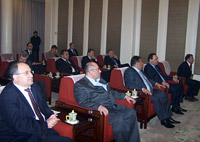 We also discussed issues concerning Shansu-Nairit joint factory, which opening date has been prolonged till the beginning of next year,” said Hovik Abrahamyan concerning the memorandum. “It is very important that a country which has good relations with us stays strong because we are interested in it too. And if a strong country such as China is a friendly country to us, I am really happy for that. I believe that in the future China will keep developing and it has potential for dual digit growth. I believe that the mechanisms which work in China are really justified. As the president of the Armenian National Assembly, I am happy to see that China is developing day by day.”
We also discussed issues concerning Shansu-Nairit joint factory, which opening date has been prolonged till the beginning of next year,” said Hovik Abrahamyan concerning the memorandum. “It is very important that a country which has good relations with us stays strong because we are interested in it too. And if a strong country such as China is a friendly country to us, I am really happy for that. I believe that in the future China will keep developing and it has potential for dual digit growth. I believe that the mechanisms which work in China are really justified. As the president of the Armenian National Assembly, I am happy to see that China is developing day by day.”
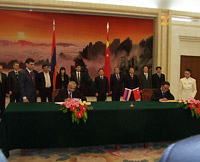 On December 17 the Armenian delegation left for Haikou city of China, where they visited a car factory and met with People’s party representatives of the region. They got acquainted to the historical sights and were informed about annual touristic turnout and achievements in the economic sector. The representatives of the People’s party of Haikou said that their economic growth rate is higher than that of Armenia. Concerning this point Hovik Abrahamyan said the following: “That is why we are here, Armenia has ten regions, and we are here to see your experience.”
On December 17 the Armenian delegation left for Haikou city of China, where they visited a car factory and met with People’s party representatives of the region. They got acquainted to the historical sights and were informed about annual touristic turnout and achievements in the economic sector. The representatives of the People’s party of Haikou said that their economic growth rate is higher than that of Armenia. Concerning this point Hovik Abrahamyan said the following: “That is why we are here, Armenia has ten regions, and we are here to see your experience.”
It is worth mentioning that besides asking for the borrowing Hovik Abrahamyan also invited China to take part in the construction of Iran-Armenia railway and brought facts proving that this project is economically justified. Journalists were not informed any details about this invitation and China’s response.
P.S. The security officers were closing the roads upon arrival of the cars of the delegation as it is usually done in Armenia as well during the visits of foreign delegations. Notwithstanding it doesn’t become an obstacle for traffic. In other words, they don’t create car congestions. In a word, in consideration of the number of the Chinese population and cars we may assume that the allegations of the government that the car congestions of Yerevan are a result of “economic growth”. The difference is that the Chinese security service are doing it in an organized manner and are not closing the ways hours before the visit but a couple of minutes before the arrival of people. Armenians learn about visits of foreign delegations when they see that the roads and ways are closed, but in China people hear about such visits only on TV. For example, if the Armenia flag was not put next to the Chinese flag on the cars, hardly the Chinese people would know that Armenians had visited their country.

